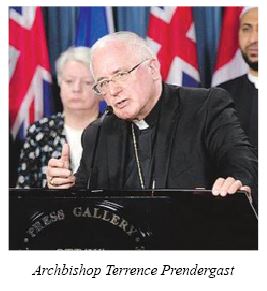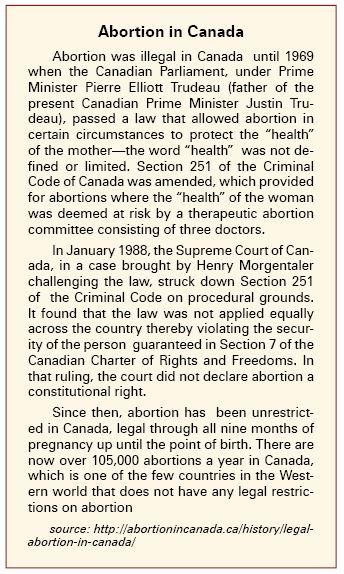At a news conference held October 29, 2015, on Parliament Hill, the Canadian Conference of Catholic Bishops (CCCB) and The Evangelical Fellowship of Canada (EFC) released a joint statement on euthanasia and assisted suicide.
 The “Declaration on Euthanasia and Assisted Suicide” has been endorsed by over 30 Christian denominations together with over 20 Jewish and Muslim leaders from across Canada. In light of the Supreme Court of Canada’s ruling in R. v. Carter, the joint statement advocates for palliative care, respect for the dignity of the human person, human solidarity, and psychological, spiritual and emotional support as the ethical and moral response in end-of-life care.
The “Declaration on Euthanasia and Assisted Suicide” has been endorsed by over 30 Christian denominations together with over 20 Jewish and Muslim leaders from across Canada. In light of the Supreme Court of Canada’s ruling in R. v. Carter, the joint statement advocates for palliative care, respect for the dignity of the human person, human solidarity, and psychological, spiritual and emotional support as the ethical and moral response in end-of-life care.
During the press conference, Most Rev. Terrence Prendergast, Archbishop of Ottawa and representative of the Canadian Conference of Catholic Bishops, said: “The biggest fear is that we have the same situation as we have with abortion, which is no regulations, no controls, no safeguards, “ he said. “We would have people, teenagers, deciding that they don’t want to live and they’d ask the doctor to put them away.”
Following the decision of the Canadian Supreme Court on Feb. 6, 2015, decriminalizing euthanasia and assisted suicide, the Canadian government has three options: invoke the notwithstanding clause so that the decision of the court won’t be applied, do nothing – which amounts to make legal euthanasia and assisted suicide – or legislate.
Here is the full text of this joint declaration of religious groups:
Assisted suicide and euthanasia raise profound social, moral, legal, theological and philosophical questions — questions that go to the very core of our understanding of who we are, the meaning of life, and the duty of care we owe to each other. The recent Supreme Court of Canada decision has brought this issue to the forefront of public discussion and compels each of us as Canadians to reflect upon our personal and societal response to those who need our compassion and care.
We, the undersigned, each from the basis of our sacred teachings and enduring traditions, affirm the sanctity of all human life, and the equal and inviolable dignity of every human being. This is an affirmation shared by societies and cultures around the world and throughout history. Human dignity is not exclusively a religious belief, although for us it has a significant religious meaning. Furthermore, we affirm that reverence for human life is the basis and reason for our compassion, responsibility and commitment in caring for all humans, our brothers and sisters, when they are suffering and in pain.
The sanctity of human life is a foundational principle of Canadian society. It has both individual and communal import: it undergirds the recognition of the equal dignity of each individual regardless of their abilities or disabilities and shapes and guides our common life together, including our legal, health care and social welfare systems. It engenders the collective promotion of life and the protection of the vulnerable.
While Canadian society continues to affirm the importance of human dignity, there is a worrisome tendency to define this subjectively and emotionally. For us, human dignity is most properly understood as the value of a person’s life before her or his Creator and within a social network of familial and societal relationships. We are convinced the only ways to help people live and die with dignity are: to ensure they are supported by love and care; to provide holistic care which includes pain control as well as psychological, spiritual and emotional support; and, to improve and increase resources in support of palliative and home care.
On the basis of our respective traditions and beliefs, we insist that any action intended to end human life is morally and ethically wrong. Together, we are determined to work to alleviate human suffering in every form but never by intentionally eliminating those who suffer.
The withholding or withdrawal of burdensome treatment must be distinguished from euthanasia and assisted suicide. The intention in such cases is not to cause death but to let it occur naturally. We understand that under certain circumstances it is morally and legally acceptable for someone to refuse or stop treatment. The refusal of medical treatment, including extraordinary measures, is very different from euthanasia or assisted suicide. Euthanasia is the deliberate killing of someone, with or without that person’s consent, ostensibly in order to eliminate suffering. Assisted suicide occurs when one person aids, counsels or encourages another person to commit suicide. There is a fundamental difference between killing a person and letting her or him die of natural causes.
Euthanasia and assisted suicide treat the lives of disadvantaged, ill, disabled, or dying persons as less valuable than the lives of others. Such a message does not respect the equal dignity of our vulnerable brothers and sisters.
Health care systems must maintain a life-affirming ethos. Medical professionals are trained to restore and enhance life. They are not trained or expected to administer death. Any change in this regard would fundamentally distort the doctor/patient relationship. Similarly, all members of society are called upon to do their utmost to protect their neighbours when their lives or safety are threatened. This basic care and concern, so fundamental to society, is evident in the continuing efforts to provide better, readily available palliative and home care.
Health Canada defines palliative care as “an approach to care for people who are living with a life-threatening illness, no matter how old they are. The focus of care is on achieving comfort and ensuring respect for the person nearing death, and maximizing quality of life for the patient, family, and loved ones, and is a societal affirmation of caring for the most vulnerable amongst us. Palliative care addresses different aspects of end-of-life care by: managing pain and other symptoms; providing social, psychological, cultural, emotional, spiritual and practical support; supporting caregivers; providing support for bereavement.” Assisted suicide and euthanasia are contrary to the philosophy and practice of palliative care.
In light of the recent decision of the Supreme Court of Canada, we urge federal, provincial and territorial legislators to enact and uphold laws that enhance human solidarity by promoting the rights to life and security for all people; to make good-quality home care and palliative care accessible in all jurisdictions; and to implement regulations and policies that ensure respect for the freedom of conscience of all health-care workers and administrators who will not and cannot accept suicide or euthanasia as a medical solution to pain and suffering.
Humanity’s moral strength is based on solidarity, communion and communication – particularly with those who are suffering. It is personal attention and palliative care and not assisted suicide or euthanasia that best uphold the worth of the human person. It is when we are willing to care for one another under the most dire of circumstances and at the cost of great inconvenience that human dignity and society’s fundamental goodness are best expressed and preserved.
source: http://www.euthanasiadeclaration.ca
